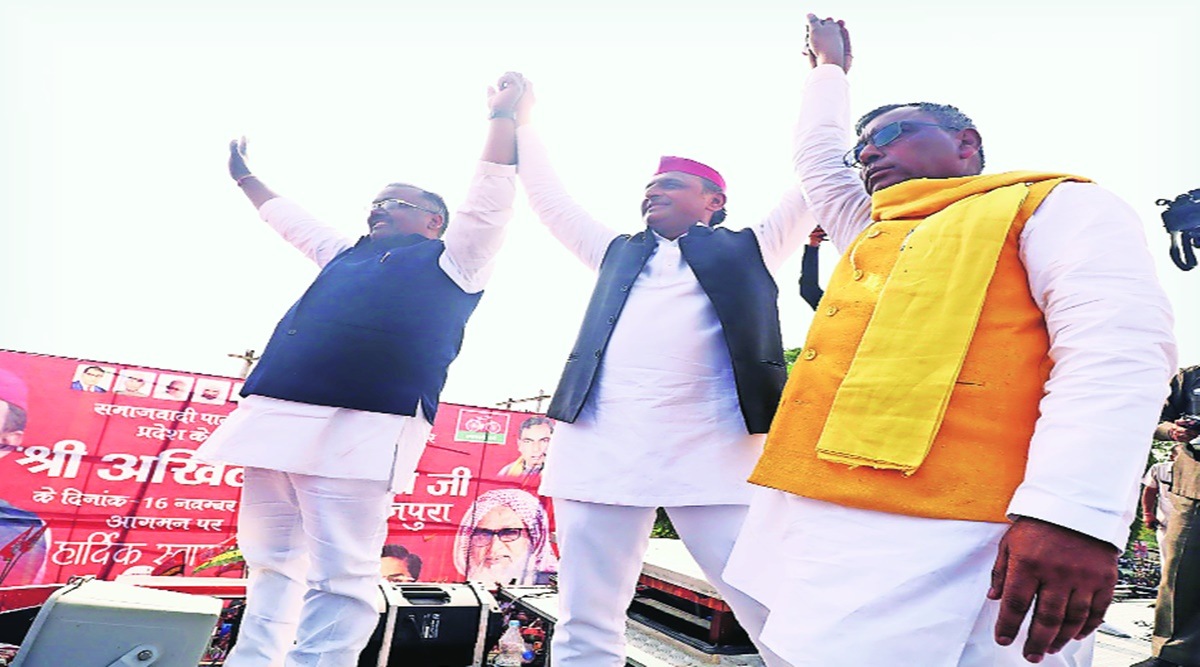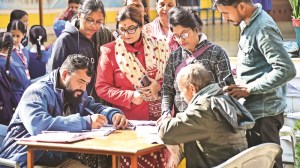The significance of smaller parties’ role in the 2022 Assembly elections in Uttar Pradesh has not been lost on the bigger political parties this time. So when Samajwadi Party president Akhilesh Yadav shared the stage with OP Rajbhar, the chief of Suheldev Bharatiya Samaj Party (SBSP), at a rally in Mau last month, he underlined the importance of such smaller parties, which generally represent a particular caste or region, saying: “I am confident the marginalised communities of Uttar Pradesh will flush the BJP out of the state.”
After snapping ties with the BJP in the run-up to the 2019 Lok Sabha elections, Rajbhar had been trying to cobble together an alliance of smaller parties and even brought Asaduddin Owaisi’s AIMIM and Chandrasekhar Azad’s Bhim Army under its umbrella front – Bhagidari Sankalp Morcha. But even before the front could take shape, Rajbhar joined hands with the Samajwadi Party (SP).

To make up for its loss of Rajbhar, the ruling BJP is now looking for alternatives. The party is grooming its minister Anil Rajbhar as a prominent face of the Rajbhar community. To show his strength and grip among Rajbhars, Anil is planning to hold a rally in Mau later this month.
The reason why BJP is looking for a replacement of Rajbhar’s SBSP can be understood from the 2019 Assembly bypoll results in seats like Ghosi and Jalalpur, where SBSP polled a significant number of votes – 11,485 in Ghosi and 9,040 in Jalalpur – narrowing the BJP’s win margin significantly.
However, the party discounts the impact of SBSP’s exit on the party’s poll prospect. “BJP has always given respect to regional parties who have a similar ideology and they have been given space in NDA. In the 2019 Lok Sabha polls too, we had an alliance with Nishad Party. Regional parties support larger parties so that they can work for the welfare and growth of their community and area of influence,” said BJP spokesperson Rakesh Tripathi.
Fearing the loss of votes in selective pockets in the state, the BJP has been forging alliances and seeking support from many smaller parties. On October 27, the day Akhilesh and Rajbhar held their joint rally at Mau, the BJP announced that it has got the support of seven parties from eastern UP – Bharatiya Manav Samaj Party, Mushar Andolan Manch (Garib party), Soshit Samaj Party, Manavhit Party, Bharatiya Suheldev Janata Party, Prithviraj Janshakti Party and Bharatiya Samata Samaj Party.
These parties claim influence among OBCs in eastern UP districts of Jaunpur, Ghazipur, Ballia, Varanasi, Azamgarh and Etah districts in western UP.
Story continues below this ad
This week, local outfits like Pragatisheel Samaj Party, Manav Kranti Party, Samajik Nyay Navlok Party, Jalvanshi Kranti Dal, who claim to have an influence among backward castes like Nishads, Kushwahas, Lodhs among others also extended their support to the BJP.
The SP, too, has been looking at smaller parties of non-Yadav OBCs to compensate for the possible loss of Muslim votes which may happen due to AIMIM announcing its plan to field candidates in 100 seats.
With a focus on Muslim-dominated areas, AIMIM chief Owaisi launched his party’s poll campaign from Ayodhya district’s Rudauli in September. Recently, he visited Muzaffarnagar. He is scheduled to address Sochit Vanchit Samaj Sammelan in Moradabad, Meerut, Aligarh, Barabanki, Jaunpur and Balrampur this month.
In last year’s Assembly bypoll, AIMIM candidate got 4,757 votes in Bulandshahr, and came third, head of BSP and Congress, in Pratapgarh by polling 20,269 votes. But SP spokesperson Rajendra Chaudhary claimed that AIMIM is “irrelevant in UP”.
The SP, which have been dominating the Muslim-Yadav votebank for a long time, has, therefore, joined hands with SBSP, Mahan Dal and Janwadi Socialist Party, which have an influence on non-Yadav OBC castes in eastern UP. The party has also forged an alliance with Rashtriya Lok Dal (RLD), a party with a strong support base among the farmers in west UP.
Story continues below this ad
Mahan Dal claims influence among “non-Yadav” OBC communities like Shakya, Saini, Maurya and Kushwaha in over a dozen Lok Sabha constituencies in western UP, including Aonla, Mainpuri, Etah, Nagina, Badaun and Jaunpur in eastern UP. In the 2017 Assembly polls, the Mahan Dal contested in 14 seats alone and polled 96,087 or 0.11 per cent of the total votes. All its 14 candidates lost their deposits.
The Janwadi Socialist party of Sanjay Singh Chauhan also draws strength from members of the Bind and Kashyap communities that are in sizeable numbers in over a dozen districts of eastern UP like Ballia, Jaunpur, Prayagraj among others.
Akhilesh recently welcomed former MLA Sigbatullah Ansari, brother of gangster-turned-politician Mukhtar Ansari, in the party. In 2016, Akhilesh had denied the merger of Ansari’s Quami Ekta Dal (QED) into SP, following which the Ansari brothers joined hands with BSP. Though Ansari is currently in jail, his family has a sizeable influence in eastern UP districts such as Ghazipur, Ballia, Mau, Azamgarh and Varanasi.
In recent weeks, the SP has also garnered support from little-known parties such as Sarvsamaj Ekta Dal, Rashtriya Jansambhavna Party, Sarvjan Sampta Party and Abhay Samaj Party. “Regional and local parties are extending support to the SP because they understand that to save democracy, it is necessary that Akhilesh Yadav forms the next government in UP,” the SP spokesperson said.
Story continues below this ad
There are also talks of Akhilesh announcing the merger of estranged uncle Shivpal Singh Yadav’s Pragatisheel Samajwadi Party-Lohia with the SP on the birthday of party founder Mulayam Singh Yadav later this month.
With SP poaching prominent BSP veterans like Ram Achal Rajbhar and Lalji Verma, Akhilesh has been trying to make inroads among Dalits too and emphasizing the “need to bring together the ideologies of both BR Ambedkar and Ram Manohar Lohia to oust the BJP from power in the state”.
This week as Akhilesh started the fourth leg of his ‘Vijay Rath Yatra’ from Lucknow to Ghazipur on Purvanchal Expressway, he was flanked by Sigbatullah Ansari, Sanjay Singh Chauhan and OP Rajbhar – a signal to how small parties could tilt the scale of the elections this time.









